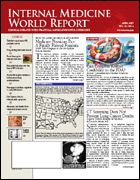Publication
Article
Internal Medicine World Report
Don't Ignore Diabetes in Patients Hospitalized for Stroke
Author(s):
From the International Stroke ConferenceUnmanaged Risk Factors Can Cause Recurrence
SAN FRANCISCO?Risk factors associated with diabetes are not well controlled and often ignored in patients with acute stroke, reported Lee Schwamm, MD, at the 2007 International Stroke Conference. Ignoring diabetes places these patients at increased risk for recurrent stroke and cardiovascular and microvascular complications.
"Despite high rates of diabetes in the community, evidence-based targets for risk-factor management are not being met in diabetics," he said. Patients with diabetes who were undiagnosed until their admission for stroke had worse risk-factor profiles at admission and discharge.
For this study, data were obtained on 159,338 patients who suffered an ischemic stroke or transient ischemic attack (TIA). Of these, 46,436 had known diabetes at the time of their admission for stroke, and 2630 were newly diagnosed with diabetes at stroke admission. Adherence to a subset of evidence-based interventions relevant to diabetes care was analyzed.
Compared with patients with known diabetes prior to their index stroke or TIA, those with newly diagnosed diabetes had a higher rate of ischemic stroke (88.7% vs 77.7%, respectively), higher mean low-density lipoprotein cholesterol (LDL-C) level (117.6 mg/dL vs 106.1 mg/dL), higher hemoglobin (Hb) A1c levels (8.18% vs 7.87%), and a greater prevalence of atrial fibrillation (13.0% vs 10.2%). More patients with known diabetes were smokers (19.9% vs 13.7%), and more of them met the diagnostic criteria for obesity (31.2% vs 27.2%).
Patients with newly diagnosed diabetes had fewer documented vascular risk factors before admission and were more likely to have their HbA1c or LDL-C measured while in the hospital.
Some 41% of the known diabetic patients had no cholesterol measurement taken in the hospital. Of those with LDL-C measurements, 29% had levels above the 100-mg/dL goal for patients with diabetes.
Hyperlipidemic patients with newly diagnosed diabetes were often discharged without receiving cholesterol-reducing medications.
"What's really startling is that 66% of the patients who were known to be diabetic had no measure of long-term diabetic control while in the hospital, which tells you that the diabetes is simply not being addressed effectively in the in-patient setting. They're in for their stroke, and they're out," said Dr Schwamm, vice chairman of neurology and director of acute stroke services at Massachusetts General Hospital, Boston.
Of the patients who had HbA1c measurements in the hospital, 18% with known diabetes and 36% with newly diagnosed diabetes had levels >7%, indicating lack of control.
The LDL-C and HbA1c findings were the most disconcerting, said Dr Schwamm. "If you're recognized as a diabetic, lipid control becomes a very important intervention," he said. "The failure to detect diabetes means that they're less likely to have lipid control introduced, and control of the diabetes itself was obviously less good in the patients who weren't known to have diabetes, because they're walking around with essentially unmanaged diabetes."
Aggressive lipid management should be an important part of management in all patients with diabetes but especially those who just had an atherosclerotic event, he said.
Medication optimization also left something to be desired, said Dr Schwamm. Only 60% of the known diabetics who were taking an antihypertensive agent when admitted for stroke left the hospital with an angiotensin-converting-enzyme inhibitor or angiotensin receptor blocker. "That percentage would be much higher if they were admitted for diabetes, but they're coming in for stroke, and they're not getting the optimal choice of agents for their diabetic management," he said.
Key points
? Diabetes is not being addressed effectively in patients hospitalized for stroke.
? 41% of those with known diabetes had no cholesterol measurements.
? Only 75% of those with newly diagnosed diabetes were discharged on cholesterol-reducing therapy.
? Aggressive risk factor control is vital to the management of all diabetic patients but especially those with stroke.






